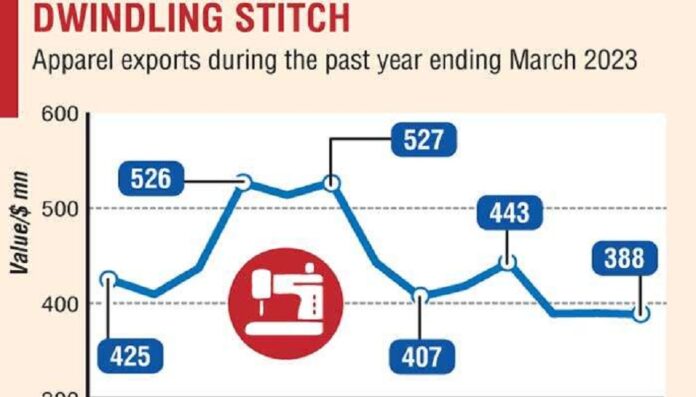By: Staff Writer
Colombo (LNW): Apparel exports in March had sunk to a three year low reinforcing the tough times faced by the industry reiterating its concerns that 2023 will be very challenging.
Stakeholders were concerned that the lack of steady supply of fuel and electricity would affect the smooth operations of the industry.
On the other, it was noted that brands and retailers have started to move sourcing orders from Sri Lanka to neighboring countries to mitigate the risks.
Some of the expected consequences were loss of business and revenue and re-location of production to other countries. Furthermore, given that Sri Lanka’s apparel production relies on imported raw material, an increased concern was the ability of Sri Lankan manufacturers to afford the foreign currency reserves required to purchase raw material to fulfill orders.
As per provisional data, apparel exports in March amounted to US $ 388.36 million, lowest for the month since 2020’s $299.87 million.
In comparison to last year, the dip in March 2023 is 11% and as against 2019’s $ 504 million it is a sharp 23% decline. March 2023 also marked the third month of exports below $ 400 million level.
Since September last year, apparel exports have been on a downward trend year on year.Exports in the first quarter were down by $ 208 million or 15% to $ 1.18 billion.
Apparel exports to the US, the biggest market, amounted to $ 151.73 million down by 16.5% from last year in March. Exports to the EU declined by 7.2% to $ 117.50 million. Shipments to the UK declined by 6% to $ 59 million.
Exports in the 1Q to the US were down by 22% to $ 470 million and to the EU by 13% to $ 344 million. First quarter exports to the UK were down 10% to $ 167.7 million.
Recently, the industry body Joint Apparel Association Forum warned of upward pressure on cost making Sri Lankan exports less competitive especially after the Government decided to implement Gazette no. 2321/62 which has been roundly condemned by exporters and importers.
JAAF said already cost increases have been announced as freight is being dismantled and charges are being rolled out to avoid market forces and urged President Ranil Wickremesinghe to resolve the crisis triggered by anti-competitive behaviour by shipping service providers.
Central Bank referring to February data said reduced demand from major markets for garments due to unfavourable economic conditions globally mainly contributed to this outcome.
Future outlook remains depressed for the apparel industry as well given high inventories accumulated from last year’s purchases by buyers. Industry previously expected exports to turn around from June but the latest assessment is that it could be September.
Future orders appear slim as well. Import of textiles in the first two months of this year are down by 40% to $ 383 million. In the first half of last year (January to June) imports grew by 16% to $ 1.68 billion before finishing the year flat at $ 3 billion.

